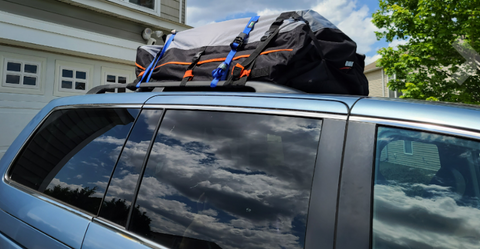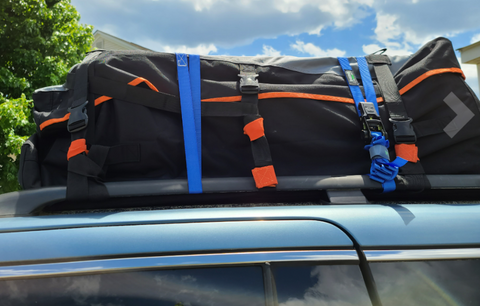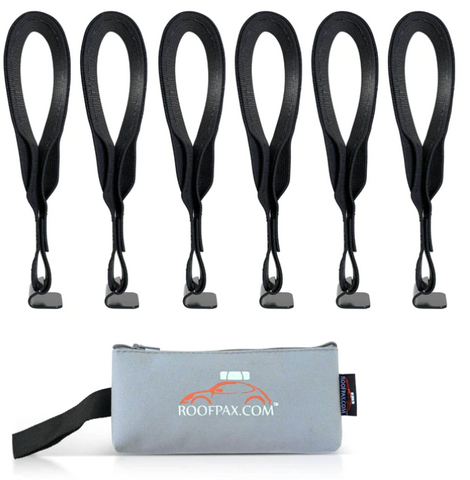How Do Car Straps for Roof Ensure Secure Cargo Transportation?

Carrying cargo on the roof of your vehicle can be a convenient solution for expanding storage space, whether you're embarking on a road trip or simply need to transport large items. However, ensuring the safety and security of your cargo is paramount. This is where car straps for the roof come into play. In this article, we'll delve into the intricacies of car straps for the roof, exploring their types, functionality, and why they are essential for secure cargo transportation.
Importance of Secure Cargo Transportation
Ensuring secure cargo transportation is paramount for several reasons. Firstly, it prevents items from shifting or falling off the vehicle during transit, reducing the risk of accidents and damage to both the cargo and other road users. Secondly, securely fastened cargo maintains stability, thereby improving vehicle handling and reducing the likelihood of disruptions to your journey. Additionally, proper cargo securing adheres to legal regulations, avoiding potential fines and penalties for non-compliance.

What are Car Straps for Roof?
Car straps for a roof, also known as roof straps or roof rack straps, are specialized tools designed to secure cargo onto the roof of a vehicle. They are typically made from durable materials such as nylon or polyester and feature robust fastening mechanisms to keep cargo in place during transit. These straps play a crucial role in preventing the shifting, sliding, or falling of items loaded onto the roof, thereby ensuring safe transportation.
How Do Car Straps Work?
Car straps for the roof operate on the principle of tensioning and fastening to secure cargo in place. Here's how they work:
- Mechanics of Securing Cargo: Car straps are typically threaded through or around the cargo and attached to anchor points on the roof rack or vehicle frame. Once in position, the straps are tightened to create tension, holding the cargo firmly in place.
- Tensioning and Fastening: Depending on the type of strap, tension is applied either manually, using a ratcheting mechanism, or by adjusting the length of the strap. Once the desired tension is achieved, the straps are fastened securely to prevent loosening during transit.
Advantages of Using Car Straps for Roof
There are several advantages to using car straps for the roof:
- Enhanced Safety: Car straps provide a reliable method of securing cargo, reducing the likelihood of accidents caused by shifting or falling items.
- Increased Storage Capacity: Roof-mounted cargo allows for additional storage space inside the vehicle, ideal for bulky items such as cargo bag, sports equipment, or camping gear.
- Versatility: Car straps can accommodate various types of cargo, including luggage, bicycles, kayaks, and more, making them suitable for a wide range of transportation needs.
- Easy Installation: Most car straps for the roof are designed for quick and straightforward installation, requiring minimal tools and expertise.
- Cost-Effective Solution: Investing in car straps is a cost-effective way to expand storage capacity without the need for expensive modifications to the vehicle.

What Are the Different Types of Car Straps?
Car straps for the roof come in various types, each suited to different purposes and vehicle configurations. Some common types include:
- Ratchet Straps: These straps feature a ratcheting mechanism that allows for precise tensioning, ensuring a secure hold on the cargo.
- Tie-Down Straps: Tie-down straps utilize a simple buckle or hook-and-loop closure system to fasten cargo to the roof rack securely.
- Bungee Cords: Bungee cords are elasticated cords with hooks on either end, providing flexibility for securing irregularly shaped items.
- Rope or Cordage: Traditional rope or cordage can also be used to tie down cargo, although they may require more skill to secure properly.
- Tow Straps: Heavy-duty tow straps are designed for towing vehicles or hauling large loads, providing robust support and reliability.
Comparison of Car Straps
When choosing car straps for the roof, it's essential to consider the strengths and weaknesses of each type:
- Strengths: Precise tensioning, secure fastening, suitable for heavy loads.
- Weaknesses: Requires manual operation, and limited flexibility in positioning.
- Strengths: Easy to use, versatile, and suitable for irregularly shaped cargo.
- Weaknesses: May loosen over time, less suitable for heavy loads.
- Strengths: High tensile strength, ideal for towing vehicles and hauling large loads.
- Weaknesses: Limited flexibility for securing smaller items, may require additional equipment for attachment.
Which Car Straps for Roof Are Ideal for Outdoor Adventure Gear?
For outdoor enthusiasts transporting gear such as kayaks, bicycles, or camping equipment, robust and reliable straps are essential. Ratchet straps or heavy-duty tie-down straps are ideal for securing bulky or heavy items, providing the necessary strength and stability for outdoor adventures.

What are the Weight Limits for Car Roof Straps?
The weight limits for car roof straps vary depending on the type and quality of the straps. It's crucial to consult the manufacturer's specifications to ensure that the straps are rated for the weight of the cargo being transported. Exceeding the weight limit can compromise the integrity of the straps and pose a safety risk.
Can Car Roof Straps Be Used in All Weather Conditions?
High-quality car roof straps are designed to withstand a wide range of weather conditions, including rain, snow, heat, and cold. However, it's essential to ensure that the straps are properly secured and adjusted to maintain their effectiveness in adverse weather. Additionally, periodic inspection and maintenance of the straps can help identify any signs of wear or damage that may compromise their performance in challenging weather conditions.
How Many Straps Are Needed to Secure Outdoor Gear?
The number of straps required to secure outdoor gear depends on the size, weight, and shape of the cargo, as well as the specific mounting points available on the vehicle's roof rack. As a general rule of thumb, it's recommended to use at least two straps per piece of cargo to ensure optimal stability and security. For larger or heavier items, additional straps may be necessary to distribute the weight evenly and prevent shifting during transit.

Are Car Roof Straps Compatible with All Types of Vehicles?
While car roof straps are designed to be versatile and compatible with a wide range of vehicles, including sedans, SUVs, trucks, and vans, compatibility may vary depending on the vehicle's roof design and configuration. Vehicles equipped with roof racks, raised side rails, or flush rails provide convenient attachment points for securing straps. However, it's essential to ensure that the straps are compatible with the vehicle's roof rack system and that they can be securely fastened without interfering with other vehicle components. Additionally, some vehicles may require additional accessories or adapters to secure the straps properly.
In Conclusion
Car straps for the roof are essential tools for ensuring secure cargo transportation, particularly when traveling with outdoor gear or bulky items. By understanding the different types of straps available, how they work, and their strengths and weaknesses, drivers can choose the right solution for their specific needs. Whether embarking on a road trip, transporting sports equipment, or moving furniture, investing in quality car straps is key to safe and stress-free travel.
BuyRoofpax offers a wide range of premium car roof straps and accessories, including ratchet straps, tie-down straps, and roof rack soft pads, designed to meet the diverse needs of outdoor enthusiasts and travelers. With BuyRoofpax, you can trust that your cargo will be securely fastened and protected, allowing you to enjoy peace of mind on your next adventure.
FAQs: How Do Car Straps for Roof Ensure Secure Cargo Transportation?
What are Car Straps for Roofs and Why Are They Important?
Car straps for the roof, also known as roof straps or roof rack straps, are specialized tools designed to secure cargo onto the roof of a vehicle. They are crucial for ensuring secure cargo transportation and preventing items from shifting or falling off during transit. This enhances safety, stability, and legal compliance while driving.
How Do Car Straps Work?
Car straps operate on the principle of tensioning and fastening to secure cargo. They are threaded through or around the cargo and attached to anchor points on the roof rack or vehicle frame. Tension is applied either manually or using a ratcheting mechanism, ensuring a tight hold on the cargo.
What Are the Advantages of Using Car Straps for Roofs?
Car straps enhance safety by preventing accidents caused by shifting cargo. They also increase storage capacity, accommodate various types of cargo, are easy to install, and offer a cost-effective solution for expanding storage space without vehicle modifications.
What Are the Different Types of Car Straps?
Car straps come in various types, including ratchet straps, tie-down straps, bungee cords, rope or cordage, and tow straps. Each type has its strengths and weaknesses, making them suitable for different purposes and cargo types.
Which Car Straps Are Ideal for Outdoor Adventure Gear?
For transporting outdoor gear such as kayaks, bicycles, or camping equipment, robust straps like ratchet straps or heavy-duty tie-down straps are ideal. They provide the necessary strength and stability for securing bulky or heavy items during outdoor adventures.
What are the Weight Limits for Car Roof Straps?
The weight limits for car roof straps vary depending on their type and quality. It's essential to consult the manufacturer's specifications to ensure that the straps are rated for the weight of the cargo being transported. Exceeding weight limits can compromise strap integrity and pose safety risks.




